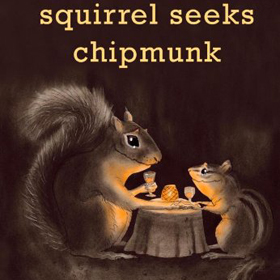Squirrel Seeks Chipmunk by David Sedaris

4/5
In his latest book, Squirrel Seeks Chipmunk, David Sedaris takes on the animal kingdom. Armed with his usual arsenal of humor, satire and wit, the author manages to transpose the most human of characteristics on everything from warblers, baboons, snakes, lab rats and hippos.
While the most obvious companion to this book would be Aesop’s fables, Sedaris shies away from that comparison. “I was going to call them fables, but fables always have morals, and not all of these do,” Sedaris said in an interview on NPR’s Morning Edition. “So I wound up calling it a bestiary, which is just a book in which animals do things that people do.”
Sedaris reveals all sorts of oddities, quirks and harsh realities of everyday life through his fables. In one memorable story, “The Sick Rat and The Healthy Rat,” a rat gets placed in a cage with a dying rat. The healthy rat tells the sick one, “I’m sorry to say it, but if you have a terminal illness it’s nobody’s fault but your own.” She considers her perfect health to be a result of her sunny disposition – she can never get sick, because she has a smile on her face. Soon enough, a scientist injects her with AIDS, causing the sick rat to concoct a limerick:
A she-rat I had as a roomie
said illness just strikes if you’re gloomy.
Since she was injected
with AIDS, I’ve detected
an outlook a lot less perfumy.
Horrible? Yes. Funny? Without a doubt. Sedaris doesn’t shy away from highlighting the schadenfraude we all feel when an uppity snob gets their comeuppance.
In another story, the squirrel and the chipmunk from the book’s title have been dating for a few weeks before running out of things to talk about. They have already had two conversations about how spoiled dogs are, so one night, the squirrel mentions that he likes jazz. The chipmunk, not knowing what jazz is, blindly agrees and resolves to ask her sister about this so-called jazz when she gets home. The sister doesn’t know, but decides that anyone who likes jazz is not someone her sister should be hanging around with, especially since he’s a squirrel.
That story touches on the troubles of interracial dating. Another story touches on the follies of parenting, another on the relationships between mother and son, another on husband and wife and even one on the relationship between an AA member and his sponsor. Sedaris leaves no stone unturned in his exploration of humanity, which is no big surprise for fans of his previous books.
The illustrations, by Ian Falconer, capture the tone of the stories without revealing too much. They are exaggerated and yet understated at the same time, a good match for Sedaris' humor.
This book is less laugh-out-loud than some of his older stories, as there are no performance art pieces or adventures in France here. But there is the same poignancy to his stories. Each story may not have a moral, but it certainly has meaning.
RELATED ARTICLES
Get the most-revealing celebrity conversations with the uInterview podcast!







Leave a comment